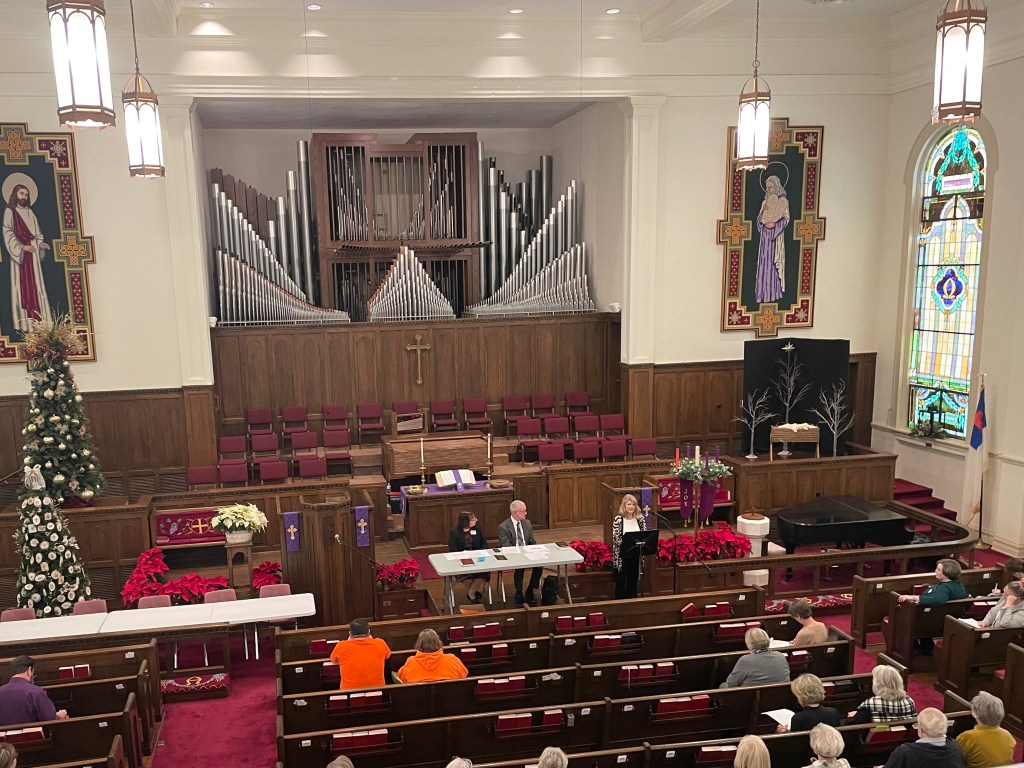Here is my personal FAQ, with answers to real questions that I continue to hear from those leaning towards disaffiliation. I am thankful for all who are willing to engage in the conversation.
- How can we stay in a denomination with such doctrinal drift?
- How can we stay in a denomination where people are praying to a “Queer God?”
- How can we accept something that goes against the Bible? (This is at the heart for many).
- If we disaffiliate, won’t we be able to put this debate behind us, stop talking about sexuality, and get on with the business of being the church?
- But we would still be methodist, right? Just not united?
- Is this our church or does it belong to the Conference? Is this not an opportunity for us to control our own destiny?
- Will we be forced to accept views or policies that do not align with our conscience?
- What will happen at General Conference next year?
- How can we conference together in ways that glorify God and give a good witness to the world?
How can we stay in a denomination with such doctrinal drift?
In the conversations around disaffiliation, some claim that there is a movement to change the beloved doctrines of our church. In this regard, it is true that isolated examples can be found. There are those within the church who stand at the edges of doctrinal interpretation. There always has been and always will be. To use isolated examples, however, as a justification for disaffiliation must assume that this will not happen in a new denomination. That is unlikely.
Our seminaries are getting much blame for this supposed doctrinal drift. I do not believe it is founded. If we want to judge our seminaries, then I would encourage you to read the ordination papers of students applying to be ordained. Read what they have to say about the trinity, the divinity and humanity of Christ, justification and sanctification, the calling of the church, what it means to be ordained, and more. I get to do this every year, and it is inspiring. The holy apostolic faith will continue to be shared in powerful ways.
In response to accusations that our seminaries teach heresy, it is true that students can learn about other expressions of faith and explore other ideas. The trajectory, however, for those seeking ordination in the UMC is to be able to share the holy orthodox faith of the church in faithful and fruitful ways and to do so within the context and times in which they are called. For a comparison, I suspect you could go to the School of Business at the UofA and take a class on the economics of socialism, but it would not be fair to say that the school is trying to lead students in that direction.
In this larger debate about doctrinal drift, it is worth noting that there are over 30,000 United Methodist pastors in the U.S. In most discernment processes, the same handful of examples are used of people who have stood at the edges of theological interpretation and then used fallaciously to cast shade on the whole. Is it fair to base this decision on such a small sampling?
How can we stay in a denomination where people are praying to a “Queer God?”
In many places where there are people promoting disaffiliation, this has become a major talking point. It is true that such a prayer was recorded at a seminary, during Pride Month, and at a service designed to welcome members of the Plus community. Can we give this a “generous read?” As explained by students, the term ‘Queer” can be used for all who feel like they are different and who are judged because of that. It is not only about sexuality. In this case, the hope was to show that Christ stands with these beloved souls. There is much scriptural backing to say that Christ identified with the outcast, the marginalized, the judged.
In this particular case, was it shocking to hear? Yes, for many. Remembering that this came from an un-ordained student in the process of formulating how to best express her faith, was this worthy of being weaponized and used in ways to cause her harm and to cast unfair concerns upon the church as a whole? The answer is “no” in my opinion. If there is judgement to be made in how this is being communicated, the weight of that judgement should not be put on this one student in her twenties and still in school.
How can we accept something that goes against the Bible?
This question, formed in many ways, is at the heart of it all for many. Staying UMC will necessitate a willingness to accept that there may be different faithful interpretations of the passages before us. I would be among those who want to approach the matter with more humility and less judgement, a deeply rooted biblical perspective. I don’t fully understand matters of sexual orientation and identity. I do, however, stand firm on the biblical virtues and values that are life-giving for all. I do not believe a separate standard should be made for some. I want to promote a strong sexual ethic rooted in the values of faithfulness, commitment and all the virtues summed up with the word “love.”
When it comes to assessing who can be leaders in the church, I stand with those who want to focus on calling and character, rather than making blanket judgements around personal identity, that would keep us from even considering whether someone is called or has the character needed for faithful and fruitful leadership in the church.
In one setting, a person asked me, in all sincerity, to share what a different interpretation would look like. He had assumed that the scriptures were clear and that the matter was settled. I started by saying that homosexuality was a term coined in the 20th century as a medical term to denote deviate behavior. After this, the word found its way into scripture as a translation for words that point to abusive and harmful behavior. Both science and most translations have changed this understanding, but even where it still exists, Christians in the Plus community would agree that the behavior described in the original Greek is wrong. They might also say that this has nothing to do with two people wanting to live in a faithful, committed, and loving relationship. When it comes to the passage in Romans 1 and the words about doing what is unnatural, many in Plus community would agree that engaging in behaviors that are unnatural is harmful, but that they have come to a place, through much prayer and struggle, where they are comfortable living into what is natural for them.
Personally, I have come to the point where I honor those who have come to such understandings in their conversations with God through the scriptures and who have found ways to truly grow in God’s love and to be a great blessing to the church. I also lament the possibility that there may not be congregations in certain communities where such understandings would be honored.
For more on this, including a look at Matthew 19, please see my blog posts “Wesley and Human Sexuality, Parts 1 and 2.” These posts have received a lot of attention.
If we disaffiliate, won’t we be able to put this debate behind us, stop talking about sexuality, and get on with the business of being the church?
Disaffiliation is not likely to bring an end to this debate. I had a conversation recently with something committed to joining the GMC. This person was in a church where the music director was gay. The person who wanted to disaffiliate loved this music director and appreciated his giftedness and the spirit he brought to worship. I pointed out that, in the GMC, a gay person who wanted to live in a faithful relationship with another and grow in God’s love through that relationship, could not work in a church, even as a lay person. That would be grounds for dismissal. This led to some rethinking. It might also lead to attempts within the new denomination to change this policy. The debate will continue.
We have another church that has voted to disaffiliate that has a similar situation. That church is considering being independent rather than joining the GMC but that is leading to a whole different debate. Some don’t believe it would be good to be independent in this way; others do. There is now division on top of division.
Changing denominations in unlikely to help. Recently, I have had conversations with both a Baptist pastor and a Church of Christ pastor who came to me to talk about how these same questions were surfacing in their congregations and they both said, in different ways, how much they admire how I was able to talk about it without being fired. Being able to conference together in love is a good thing!
But we would still be methodist, right? Just not united?
This is an assumption that begs a lot of questions. To disaffiliate means that the local church will have to decide many things and to do so quickly. It will lead to more debate, not less, and perhaps to division on top of division. Will you still practice open communion? What liturgies and hymns will be used? What will you believe? What will your policies be? How will not secure pastoral leadership and what criteria will be used. Will you join another denomination or not? The questions will keep coming. And you will need a good lawyer to be involved. It is a good thing, in my opinion, to be rooted in the larger church where direction is given, where resources are shared, and ministry happens together.
Is this our church or does it belong to the Conference? Is this not an opportunity for us to control our own destiny?
The idea of owning our own property and controlling our own destiny is popular in some circles. In response to this, I want to affirm our calling to be in covenant together. I like knowing that I can go to any United Methodist Church and say, “This is my church.” “We share in ministry together.”
Yes, this is your church and, as a United Methodist, you are able a part of a mission that is so much bigger than you or this one place. Together, we have built a global church that makes such a difference in the world. We can think of UMCOR, Global Ministries, United Methodist Women (now United Women in Faith), United Methodist Men, Africa University, Discipleship Ministries, Assembly, and Veritas, just to name a few. The hope of those who want to Stay UMC is that we would build this upon this witness rather than tear it down.
Will we be forced to accept views or policies that do not align with our conscience? (This fear is expressed in different ways).
With so much rhetoric designed to stir up this fear it is hard to speak a word of reassurance. I heard of how one pastor tried to speak a reassuring word into the conversation about how we continue to believe in Jesus, and the other person said, “The video I watched told me you would say that and that it would be a lie.” In this case a video promoting disaffiliation was trusted over a beloved pastor.
In my opinion, there is one official statement that needs to find a way into the noise. In a letter from the Council of Bishop around this tension, we read: “We cannot be a traditional church or a progressive church or a centrist church. We cannot be a gay or straight church. Our churches must be more than echo chambers made in our own image arguing with each other while neglecting our central purpose. Instead, we must be one people, rooted in scripture, centered in Christ, serving in love, and united in the essential [of our shared faith].”
I love that and think that it is worthy of our commitment. Giving this witness would glorify and expresses a way of living the Christian faith that is so needed in our communities. In many communities the UMC may be the only church where this welcoming spirit might be offered.
For many the calling found in Ephesians chapter 4 continues to be a guiding light. The Apostle Paul begs us to live out the calling we have been given, to love one another with patience, gentleness, and humility, being eager to maintain the unity of the spirit in the bond of peace. We are called to a higher unity, represented by something more than uniformity of opinion. Our unity is rooted in a holy love that is patience and kind. It is not arrogant or rude. It does not insist on its own way, as the scripture says. How do we share this calling with one another and together as a witness to the world?
What will happen at General Conference next year?
As a delegate to General Conference, my hope is that this language around the “h-word” and incompatibility will be removed. In my opinion, it is shameful that our Church continues to use a word that hurts and de-humanizes people and turns them into issues and problems rather than beloved souls. At the same time, I do not believe this language should be replaced with language that says it is compatible. I believe we should leave that for continued holy conferencing and seeking God’s guidance, and that we should allow (and protect) clergy and congregations to follow their conscience on how to love others, and in a wide diversity of cultural contexts. That is the perspective of most delegates that I know.
In a global church, with delegates from many places and cultures, I must say that I am not optimistic that this language will change. What is more likely is that some form of regionalization will pass, allowing different regions in the world to develop their own criteria for ministry. Within the U.S, there is a desire to allow more freedom and to cultivate more openness. That is the goal. There is not, however, a desire to replace “may” with “shall.” That is not who we are as United Methodist Christians.
How can we conference together in ways that glorify God and give a good witness to the world?
In all forms of “Conferencing” may we stand together as the Body of Christ, with many parts, rooted in the historic and core doctrines of our faith, and in this rootedness, honoring the various branches of perspective and interpretation that help us all to grow in faith. May we “think and let think,” to use Wesley’s language, trusting that the Holy Spirit is at work among us to keep us centered as a whole and aligned to God’s will, recognizing that somethings this work of the Holy Spirit is a call to appreciate the spirit of those who are serving at the edges.
To build upon Wesley’s guidance, to focus on the opinions of our “party” or to want all to follow this or that “scheme of religion” is “quite wide of the point.” It is worth noting that the word “party” contains the word “part.” Attempts to make a “part” into the “whole” are destructive to the Body of Christ. According to Wesley, a methodist is to be distinguish by the love of God planted in the heart, the love that empower us to be the Body of Christ with many parts. May this continue to be our focus and our witness.




